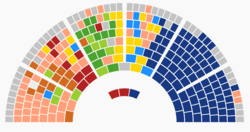Constituent Assembly of Tunisia
|
National Constituent Assembly المجلس الوطني التأسيسي al-Majlis al-Waṭanī at-Ta'sīsī |
|
|---|---|
| Type | |
| Type | |
| History | |
| Founded | November 22, 2011 |
| Preceded by | Chamber of Deputies |
| Succeeded by | Assembly of the Representatives of the People |
| Leadership | |
|
President
|
|
|
First Vice-president
|
|
|
Second Vice-president
|
|
| Structure | |
| Seats | 217 |
 |
|
|
Political groups
|
Ennahda (89)
non-inscrit (53)
Democratic Bloc (18)
Democratic Transition (13)
Ettakatol (13)
Democratic Alliance (12)
Wafa Movement (10)
|
| Elections | |
| Proportional representation in multi-member constituency party-lists | |
|
Last election
|
23 October 2011 |
|
Next election
|
26 October 2014 |
| Meeting place | |
 |
|
| Bardo Palace | |
| Website | |
| www |
|
The Constituent Assembly of Tunisia, or National Constituent Assembly (NCA) was the body in charge of devising a new Tunisian constitution for the era after the fall of President Zine El Abidine Ben Ali and his Constitutional Democratic Rally (RCD)–regime. Convoked after the election on 23 October 2011, the convention consists of 217 lawmakers representing Tunisians living both in the country and abroad. A plurality of members comes from the moderate Islamist Ennahda Movement. The Assembly held its first meeting on 22 November 2011, and was dissolved and replaced by the Assembly of the Representatives of the People on 26 October 2014.
Provisionally, a time of approximately one year was envisioned to develop the new constitution, although the convention itself was to determine its own schedule.
Before the first session of the NCA, the Ennahda, Congress for the Republic (CPR) and Ettakatol agreed to share the three highest posts in state. Accordingly, the parliament voted Mustapha Ben Jafar (Ettakatol) speaker of the NCA upon being convoked on 22 November. Meherzia Labidi (Ennahda) and Larbi Abid (CPR) were elected vice presidents.
On 10 December 2011, the assembly adopted a provisional constitution (Law on the provisional organisation of public powers) According to articles VIII and IX of the document, the requirements for the eligibility as president are exclusive Tunisian nationality (excluding citizens with dual nationality), having Tunisian parentage, religious affiliation to Islam, and an age of 35 years or more. 141 delegates approved of the law, 37 voted against, and 39 abstained.
On 12 December 2011, the NCA elected the human rights activist and CPR leader Moncef Marzouki as the interim President of the Tunisian Republic. 153 delegates voted for him, three against, and 44 votes were blank. Blank votes were the result of a boycott from the opposition parties, who disagreed with the new "mini-constitution".
...
Wikipedia
